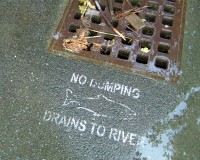By Lauren Goldberg, Staff Attorney —
Keeping toxics out of fish and shellfish in the Columbia River requires a paradigm shift in how we control polluted stormwater runoff. One of the largest sources of toxic pollution entering the Columbia is from our streets and paved surfaces. Every time it rains, runoff carries toxic contamination from industrial areas, parking lots, and roads. But there are solutions for dealing with this major source of pollution.
Earlier this month, Riverkeeper submitted public comments to the Washington Department of Ecology urging the state to take critical steps to reduce pollution from the state’s largest and mid-size cities. This year, Washington State is updating its urban areas stormwater permit to allow and encourage more use of green infrastructure, a resourceful way to prevent toxic runoff from polluting our waterways through the use of natural drainage landscaping and green building, or low impact development (LID) techniques. Ecology’s new municipal stormwater permit and LID standards is where the rubber hits the road and presents the single most important opportunity to achieve big results.
Developers are now asking the legislature to delay long-needed measures to reduce toxics in fish and shellfish. Not surprisingly, these efforts ignore the large-scale public benefits of cleaning up the Columbia and its tributaries, supporting the major public investment in recovering salmon, and protecting children and adults who rely on or enjoy eating locally caught fish free from toxic contamination. Crosscut recently posted an in-depth exposé on developers’ latest attempts to derail pollution reduction measures. Riverkeeper is working with a coalition of Washington conservation groups to ensure that Washington public officials don’t back down from their duty to the public and under the Clean Water Act to respond to the serious pollution threats from dirty stormwater runoff.



